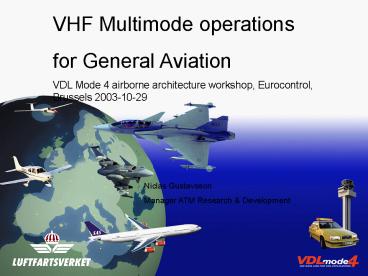VDL Mode 4 and General Aviation - PowerPoint PPT Presentation
1 / 15
Title:
VDL Mode 4 and General Aviation
Description:
Gliders x-perimental Pipers/ Cessnas Twins.. Commuters. Non commercial. Helicopters/ SAR ... VHF TX (Voice/Data) VHF RX. VHF RX. VHF RX (Voice/ Data) GNSS ... – PowerPoint PPT presentation
Number of Views:256
Avg rating:3.0/5.0
Title: VDL Mode 4 and General Aviation
1
VHF Multimode operations for General Aviation VDL
Mode 4 airborne architecture workshop,
Eurocontrol, Brussels 2003-10-29
Niclas Gustavsson Manager ATM Research
Development
2
Introduction
- This presentation is based on experiences and
input gained from working with various airspace
users for more than 10 years. The origin to this
concept are the applications enabled by Automatic
Dependant Surveillance Broadcast or ADS-B. The
general Aviation community, if considered to be
mainly non commercial operations, is sometimes
the ones that need technical improvements and
additional tools for their continued presensce in
the more and more regulated airspace of Europe
the most. However, the costs attached to the
various technologies developed for large
commercial operations can hardly ever be
justified. Starting from the VHF radio as the
common denominator in any aircraft(small and
large), Swedish CAA or Luftfartsverket(LFV) has
developed, together with industry, a VHF
multimode concept that could support a set of
data link services, identified in the community,
at an acceptable cost level. The following slides
do not represent a full description of all
possibilities or constraints but is rather an
attempt to foster discussion within the
community.
3
General Aviation meaning
Aerial work
Helicopters/ SAR
Non commercial
Gliders x-perimental Pipers/ Cessnas Twins..
Commuters
According to Eurocontrol 8,33 Vertical
expansion(ver0.8) studythis group represents
more than 90 000 Aircraft in Europé.
4
Identified requirements
- Continued/ improved presence of GA in controlled
airspace co-existence with larger commercial
A/C - No use of safety-critical ASAS applications in
cockpit for GA acceptable - ADS-B out only unless for information only( no
ops procedures) - GA not the driver in Europe?
- Min cost of equipment important
- Minimum power important
- Replacement of ELT
- Avoidance of SSR Transponder for certain
categories of aircraft like gliders - Mandatory air/ ground data link equipage not
questionable for GA
5
European planning
RNAV GNSS (EGNOS/ Galileo )
Proposed mandate for air/ ground data link
services
Mode-S mandate to support TCAS/ACAS
8,33 KHz Vertical expansion
ADS-B implementation
6
VHF radio system always required
Possible evolution
Voice DSB/AM
Voice DSB/AM 8,33
Voice DSB/AM 8,33 datalink
Voice DSB/AM
User benefit added value
7
Alternative evolution
Voice DSB/AM 8,33
Digital link ADS-B
Voice DSB/AM 8,33
Digital link ADS-B
Voice DSB/AM
Voice DSB/AM
Digital link Air/ ground
GNSS/ EGNOS Galileo
Digital link Air/ ground
GNSS/ EGNOS Galileo
Based ICAO VDL Mode 4 TDMA standard
8
VHF Multimode Radio -architecture
Frequency/ select
Baro
External devices
VHF TX (Voice/Data)
System Control
VHF RX
VHF RX
GNSS receiver
VHF RX (Voice/ Data)
9
Priority scheme
Prio
Air / Ground data link
4
ADS-B/RX
3
Voice DSB/AM/ 8,33
2
ADS-B/ TX (automatic)
1
10
TX/ RX concept
Frequency select Panel
Baro
R/X T/X
GNSS antenna
AM/ Voice RX/TX
R/X T/X
Existing VHF Antenna(s)
MAP Ext. device
GNSS rec
ADS-B Transmission
16 ms
ADS-B 1
Voice channel
ADS-B 2
Voice Transmission
11
Antenna sharing
1
2
Limitations in ADS-B rx
12
User perspective
- Surveillance
- Support ADS-B out operations
- Full access to controlled airspace
- Safety/ follow up
- Co-existence with commercial traffic
- Emergency locator
- Potential complement/ replacement to Mode-S
- Voice
- Embedded 8,33 capability for future expansion
- Data communications
- Access to basic services(ATIS, NOTAMS)
- Broadcast information(AIS)
- Navigation
- Embedded GNSS receiver with EGNOS-gtGalileo
capability - Differential GNSS support
Single investment
13
Existing trials environment
- Enhanced Operations for General Aviation EGOA
- 50 General Aviation A/C in dense TMA operations
with focus on surveillance improvements with
embedded navigation and communications elements. - Combined use of voice com and data com
- Aircraft types ranging from gliders to twin
engine - Can be expanded to adress 8.33, and GNSS/ EGNOS
use. - Trials period Q1 2004 Q4 2004.
14
Previous test and analysis
GPS
VHF
VDL Mode 4 radio
Battery
Picture showing an ADS-B equipped DG505 glider.
Early test in 2000 to evaluate power, range,
installations and user feedback.
15
Summary
- VHF Multi mode radio concept available
- Potential synergies for the GA market identifed
- GA organisations involved in the development
- Concept needs to be discussed in a wider forum
- Need to involve various programmes in Europe
focusing on the individual elements of C,N and S. - Validation and test environment available
- Certification and safety issue needs to be
further analysed and will be within EGOA. - Business case needed to verify the potential
benefits.































